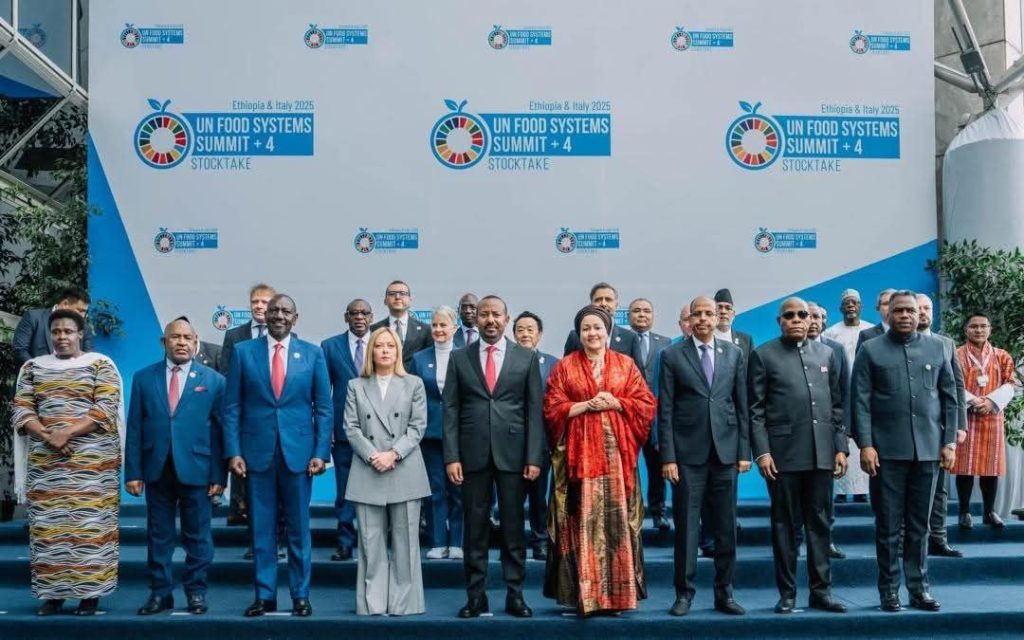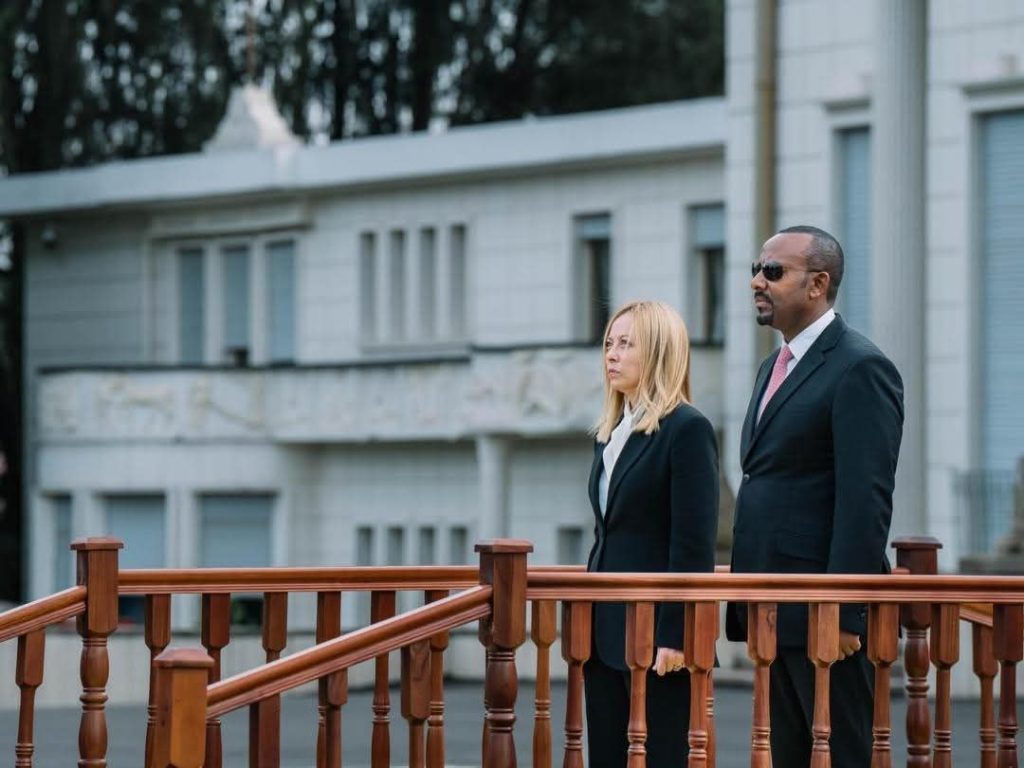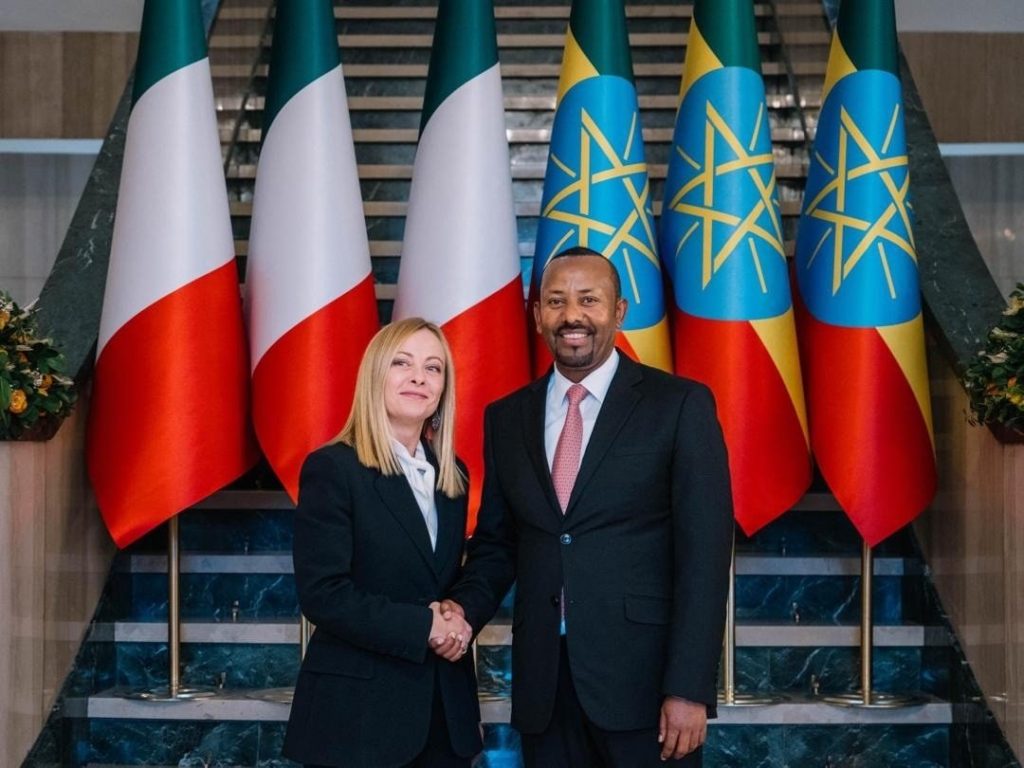(Nova News) The Prime Minister underlined that the objective of the Mattei Plan “is not to create dependence, but to support the self-sufficiency” of the African continent.
Food security and the Mattei Plan were the main themes at the centre of the two-day official visit of the Prime Minister, Giorgia Meloni, in Ethiopia. She arrived in Addis Ababa yesterday evening, accompanied by Agriculture Minister Francesco Lollobrigida and Deputy Foreign Minister Edmondo Cirielli, the prime minister was welcomed by the Ethiopian prime minister Abiy Ahmed, with whom she co-chaired the second United Nations Food Systems Summit (UNFSS+4) today.

During her remarks, Meloni emphasized that the goal of the Mattei Plan “is not to create dependency, but to support self-sufficiency” on the African continent. This goal, according to the Prime Minister, “also entails what we usually call food sovereignty,” meaning “the right of people to shape their own production model based on their own identity.” The Prime Minister then recalled “the devastating consequences” of the loss of access to food because “food security impacts not only politics but also the economy.” It can therefore be called “a global challenge,” a challenge “of absolute priority,” given that “global food insecurity still affects approximately 10 percent of the world’s population, and this percentage is largely concentrated here in Africa.” The Italian government has indeed committed to the African continent with policies aimed at strengthening cooperation and growth: “What we mean by food sovereignty does not mean continuing with standard production that lowers quality, but investing in the production of high-quality local products,” therefore “having a solid production and supply chain.”

According to the prime minister, “small producers are the backbone, the primary guardians of the land, and they must have the means to live with dignity. This is why Italy wants to do its part to promote the export of African products to the European market.” Meloni then focused on one of the cornerstones of the Mattei Plan, the agricultural sector, in which Italy “boasts unique expertise that combines tradition and innovation.” With African partners, “we have built public-private partnerships that attract investment and guarantee concrete results,” as in Algeria, where the government is committed to reclaiming over 36 hectares of desert to produce additional grains and legumes annually, “creating 600 jobs and generating benefits for over XNUMX people.” Similar initiatives are underway “also in Senegal, Ghana and Congo”, aiming to soon involve the Ivory Coast and Kenya”, as well as Tunisia, “where we are strengthening capacities and skills for the use of water, a resource around which a growing geopolitical and sovereignty challenge looms”.
The Secretary General of the United Nations also spoke at the Summit via video conference. Antonio GuterresIn his message, Guterres commended Ethiopia and Italy for their collaboration in co-hosting the second Food Systems Summit at the United Nations. He noted that since the first Summit, numerous countries have formulated and implemented strategies to transform food systems, and over 100 have launched initiatives to adapt food systems to climate change and biodiversity challenges. Guterres noted that the instability of the trade system has led to rising global food prices, thus complicating citizens’ ability to purchase healthy and safe food, and emphasized the importance of investing in food systems, as they are crucial to achieving the 17 Sustainable Development Goals. The Secretary-General then highlighted the actions taken to promote climate-resilient food systems policies, aimed at increasing production capacity and reducing dependence on imported goods, and emphasized the need to minimize waste and optimize value chains to improve productivity, while also adopting new technologies, such as artificial intelligence.

Guterres also said that developing countries need debt relief, access to essential financing, and reform of the global financial system, emphasizing the need for collective efforts to transform the food system, ensure food security, and accelerate growth.
On the sidelines of today’s Summit, Meloni and Ethiopian Prime Minister Abiy Ahmed – together with the other leaders who attended the summit, including the Somali President Hassan Sheikh Mohamud, the Kenyan one William Rutho, that of the Comoros, Azali Assoumani, the Under-Secretary-General of the United Nations Amina Mohammed and the Chairman of the African Union Commission Mohamed Yusuf – planted trees as part of Ethiopia’s “Green Legacy” initiative, launched in June 2019 with the goal of planting 20 billion saplings within four years. By the fourth year, Ethiopia had planted 25 billion saplings, mobilizing over 20 million citizens across the country. The development of over 120 tree nurseries across the country has also led to the creation of over 767 jobs, primarily for women and young people. Also on the sidelines of the UN summit, the Italian Prime Minister met with Kenyan President William Ruto, with whom they reviewed bilateral relations, starting with the excellent collaboration through initiatives in agriculture, energy, and training launched as part of the Mattei Plan for Africa. Ruto then expressed appreciation for the Italian government’s support for the energy and urban infrastructure sector. The meeting concluded with the two leaders agreeing to continue working together to promote stability in the eastern region of the African continent.

The Mattei Plan was also the central theme of yesterday evening’s bilateral meeting between Meloni and Ethiopian Prime Minister Abiy Ahmed, with a particular focus on the sectors of water, healthcare, and sustainable agriculture. The Ethiopian Prime Minister expressed satisfaction with the continued support of Italian development cooperation for the next three-year period 2026-2028, as enshrined in a joint framework declaration adopted at the ministerial level. The meeting concluded with the Prime Minister agreeing with Ahmed to continue working for regional development and stability. Also yesterday, following the meeting with the Ethiopian Prime Minister, Meloni held a bilateral meeting with the President of the African Union Commission, Mahamoud Ali Youssouf. The meeting focused on regional stability in the Horn of Africa and the role the Mattei Plan can play in strengthening the region’s infrastructure connectivity. Youssouf finally expressed broad appreciation for the initiatives of the Mattei Plan, assuring the African Union’s full and unwavering support for the Italian strategy. After various meetings in Addis Ababa, Meloni traveled to Jimma for the second leg of her official visit. Following an honorary lunch hosted by Ethiopian Prime Minister Abiy Ahmed, Meloni traveled to Lake Boye, the site of a redevelopment project under the Mattei Plan. The visit concluded in Ferenji Arada, the center of Jimma, characterized by Italian architecture.
The second United Nations Food Systems Summit (UNFSS+4), co-hosted by Ethiopia and Italy, comes four years after the first Summit in 2021 and the UN Food Systems Summit +2 “Stocktaking Moment,” which took place from 24 to 26 July 2023 at the Food and Agriculture Organization of the United Nations (FAO) headquarters in Rome. The event, which concludes tomorrow, aims to unlock financing and investment to accelerate action towards the 2030 Sustainable Development Goals (SDGs). It is a crucial moment to reflect on national efforts, explore solutions, and mobilize stakeholders towards sustainable, resilient, and inclusive food systems. On the occasion of the Addis Ababa Summit, the United Nations today released a report by Secretary-General Antonio Guterres, urging accelerated action to transform global food systems as a cornerstone for implementing the 2030 Agenda for Sustainable Development. The report comes at a crucial time, five years before the deadline for the SDGs, and outlines both the growing momentum and the urgent need to scale up the transformation of global food systems, making them inclusive, rights-based, and resilient.
The report notes that, as of 2025, 128 countries have developed national food systems transformation pathways and 155 have appointed national coordinators. Of these, 39 countries have reviewed and updated their pathways, transforming them into more concrete implementation plans. In a significant increase in accountability, 112 countries have voluntarily submitted progress reports in 2025, compared to 101 in 2023. The report also emphasizes the crucial role of the multilateral system in ensuring resilience and solutions. Looking ahead, global milestones such as the World Summit for Social Development, scheduled for November 4-6 in Doha, and COP30, to be held from November 10-21 in Belem, are expected to build on the outcomes of UNFSS+4, linking food system transformation to decent jobs, energy access and affordability, digital connectivity, education, employment, and social protection, as well as climate change, biodiversity loss, and pollution.